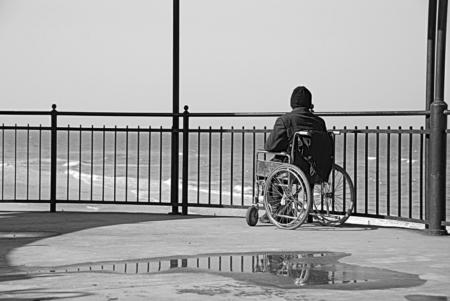Sacraments and the disabled
Q. Over the past few years, my husband has suffered a traumatic brain injury and, more recently, has been diagnosed with Alzheimer's disease. I would like him to participate in all the sacraments, as he has done faithfully since he was a child. He attends Mass with me but does not remember any prayers, cannot read them from the missal and needs assistance when receiving the Eucharist.
I have taken him with me to confession during Lent -- having him come into the reconciliation room with me, as he cannot be left unattended. The priests have heard my confession and then have given my husband a blessing. Is it appropriate for me to have him participate in the sacraments when he doesn't fully understand their significance? (New Palestine, Indiana)
A. The answer to your question is a resounding "yes." Your husband's participation is absolutely appropriate. Despite his limitations, he should be encouraged to share in the sacraments for whatever spiritual blessings and personal satisfaction they might bring him.
The U.S. Conference of Catholic Bishops has called repeatedly for broader integration of people with disabilities into the full life of the church, particularly through the sacraments.
The canonical requirements for reception of the sacraments are quite modest. For Holy Communion, there is a requirement about the use of reason but that is to be interpreted liberally. In a document entitled, "Guidelines for the Celebration of the Sacraments With Persons With Disabilities," the document notes in No. 20 that all that is necessary is that "the person be able to distinguish the body of Christ from ordinary food, even if this recognition is evidenced through manner, gesture or reverential silence rather than verbally."
As for confession, the same document states in No. 23 that "as long as the individual is capable of having a sense of contrition for having committed sin, even if he or she cannot describe the sin precisely in words, the person may receive sacramental absolution."
My guess is that in your situation the priests in the confessional have been giving your husband more than just a "blessing" and granting him absolution to whatever degree it is needed. If I were the priest, I would say to your husband, "Let's thank God for his mercy and ask his forgiveness for anything we might have done wrong." I would look to your husband for a nod or smile of recognition, dispense with any recitation of sins, act of contrition or imposition of a penance and simply go on to pronounce the words of absolution.
I must say that I am edified by your care for your husband and for his continued spiritual nourishment. To me, it stands as a beautiful example of fidelity to the marriage vow.
FATHER DOYLE IS A COLUMNIST WITH THE CATHOLIC NEWS SERVICE.
- Father Kenneth Doyle is a columnist for Catholic News Service



















